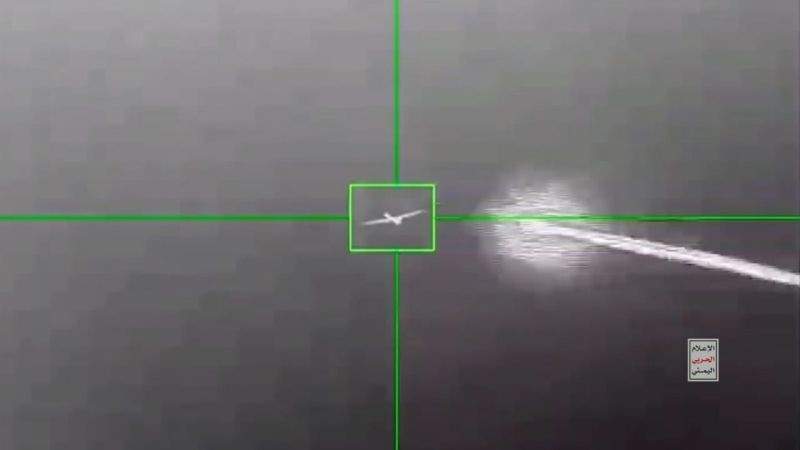Yemen’s Downing of U.S. MQ-9 Drones Signals Shift in Global Military Power and Strategy

Yemen: After naval operations marked the end of the era of aircraft carriers and sparked unprecedented discussions about shifting power balances.
The downing of such a large and unprecedented number of this specific type of drone is not a trivial event for several reasons. First, the nature of this aerial weapon, which is considered one of the most critical tools for both the U.S. Army and Navy, plays a central role in nearly every U.S. military operation worldwide.
The MQ-9 "Reaper" drones were designed to be comprehensive weapons combining advanced surveillance, espionage technologies, and cutting-edge offensive capabilities, particularly for precision strikes against high-value targets such as assassinations. These operations often require surgical accuracy without putting American personnel or pilots at risk. The U.S. relied on such drones in the assassinations of Qassem Soleimani and Abu Mahdi al-Muhandis.
The cost of these drones, over $32 million each (without additional equipment like precision missiles, smart bombs, or maritime-specific gear), clearly reflects their importance in the U.S. military arsenal. Additional equipment can add millions to the drone’s cost, as does its operational expense. This underscores that downing these drones is not a routine loss that can be easily absorbed, unlike cheaper drones that might be deployed for decoy purposes or to confuse air defenses.
These drones are controlled from U.S. military bases, which manage surveillance and attack missions directly. This means their effectiveness relies not only on the drones' advanced features but also on the capabilities of the control bases and their personnel.
The downing of eight such drones in 10 months represents a significant shock, as it reflects the failure of the advanced technology these drones represent—a rare occurrence. U.S. advanced weaponry is not merely considered tools of war but symbols of strategic superiority and deterrence. The sale or deployment of these weapons to allied countries is seen as a major advantage for those nations. When such weapons are defeated eight times in less than a year in a single location, it signifies a failure of American technological superiority, undermining political, security, and military perceptions that the U.S. heavily relies upon to maintain its reputation as a superpower.
Despite differences in cost, size, and significance, there is a comparison between the MQ-9 drones and U.S. warships. Just as attacks on the aircraft carrier USS Eisenhower and its strike group of destroyers created significant tremors and opened an unprecedented discussion in American media about the "end of the aircraft carrier era" and "America's defeat" before Yemen. The downing of eight MQ-9 drones in Yemen within less than a year is another manifestation of the end of America's dominance with drones in global airspaces, and provides additional proof of Washington's defeat by Yemen.
In the same context, the downing of this many drones in Yemen exposes the failure of the U.S. military and its officers who manage the drone control bases. The loss of eight such drones clearly indicates that the U.S. military has been unable to improve its operations regarding drone control and management in Yemeni airspace. In other words, the U.S. has tried every tactic to evade Yemeni air defenses and has failed completely, highlighting a glaring gap in American military capabilities, including those of the Navy, which operates many of these drones.
This also results in clear economic losses, both in terms of the actual cost of the downed drones, now exceeding a quarter-billion dollars, and the future of drone sales. Many countries are likely to reconsider the value of acquiring the costly MQ-9 "Reapers," which the Yemenis are downing almost monthly. India, for instance, has reportedly re-evaluated its purchase plans in recent months.
These effects are not limited to the MQ-9 but extend to the entire U.S. defense industry. The downing of these eight drones occurred in a battle that saw the failure of various advanced American military technologies, including warships, aircraft carriers, drones, and expensive defense missiles.
The issue now extends beyond individual military tools to the failure of the war strategies that the U.S. relies upon, which in turn dictate the production and development of weapons.
As many American reports have highlighted recently, Yemen has set a remarkable example of success in "asymmetric warfare" during the battle to support Gaza. This has established a new reality where the value of long-held American and Western strategies and tools, once seen as unbeatable deterrents, is diminished. The global focus is now shifting towards new types of weapons and combat methods that are dismantling the myth of American superiority, particularly since the tools and strategies of asymmetric warfare are far less expensive than those monopolized by the U.S.
-
05:04
Armed Forces: Our operations will not cease until the aggression on Gaza stops and the siege is lifted.
05:03
Armed Forces vow to continue military operations against the Israeli enemy in response to the Palestinian resistance and the calls of the free people from our nation and region.
05:03
Armed Forces: The operations were carried out using two drones of the "Yafa" type and successfully hit their targets.
05:02
Yemeni Armed Forces: Two military operations were carried out against Israeli enemy targets in the occupied areas of Ashkelon and Jaffa.
04:58
Abu Obeida: The extermination and ethnic cleansing in the northern Gaza Strip targets innocent civilians to cover up the scandals and failures of the Zionist army





